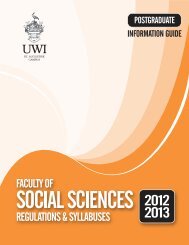Faculty of Humanities and Education (Postgraduate) - The University ...
Faculty of Humanities and Education (Postgraduate) - The University ...
Faculty of Humanities and Education (Postgraduate) - The University ...
You also want an ePaper? Increase the reach of your titles
YUMPU automatically turns print PDFs into web optimized ePapers that Google loves.
POSTGRADUATE REGULATIONS & SYLLABUSES 2012 - 2013<br />
THE FACULTY OF HUMANITIES & EDUCATION<br />
COURSE DESCRIPTIONS<br />
<strong>Postgraduate</strong> Diploma in <strong>Education</strong><br />
SEMESTER:<br />
COURSE CODE: EDFA 5210<br />
COURSE TITLE: FOUNDATIONS OF EDUCATION<br />
NUMBER OF CREDITS: 5<br />
COURSE DESCRIPTION: This course consists <strong>of</strong> five components<br />
Philosophy <strong>of</strong> <strong>Education</strong>, Psychology <strong>of</strong> <strong>Education</strong>, Sociology <strong>of</strong><br />
<strong>Education</strong>, Language in <strong>Education</strong>, <strong>and</strong> Health <strong>and</strong> Family Life<br />
<strong>Education</strong>.<br />
Syllabus<br />
A. Philosophy <strong>of</strong> <strong>Education</strong><br />
Rationale<br />
This unit is intended to provide students with a wider perspective<br />
on education <strong>and</strong> the serious questions <strong>of</strong> principle that are<br />
involved in it.<br />
OBJECTIVES<br />
<strong>The</strong> discussion <strong>of</strong> philosophical questions will:<br />
1. illustrate how philosophizing about teaching <strong>and</strong> education<br />
has practical importance in reading <strong>and</strong> in larger decisions<br />
about education;<br />
2. develop in teachers a flexible <strong>and</strong> analytical way <strong>of</strong> thinking<br />
<strong>of</strong> issues <strong>and</strong> problems in teaching;<br />
3. help teachers to analyze questions in education with<br />
comprehensiveness <strong>and</strong> penetration;<br />
4. help to clarify <strong>and</strong> formulate a clear <strong>and</strong> coherent set <strong>of</strong><br />
values to which teachers could commit themselves, <strong>and</strong><br />
strive to promote at all times.<br />
CONTENT<br />
1. Introduction<br />
Philosophy <strong>and</strong> decision-making: selection <strong>of</strong> decisions,<br />
justification <strong>of</strong> decisions.<br />
2. What is to be taught?<br />
• Principles <strong>of</strong> utility, autonomy, rationality, <strong>and</strong> truth<br />
• Whatever will most benefit each pupil<br />
• Whatever will most benefit most people<br />
• Whatever will best sustain a legitimate state<br />
• Whatever will most increase the most<br />
beneficial human knowledge<br />
3. Who should be taught?<br />
• Principles <strong>of</strong> utility <strong>and</strong> justice<br />
• Distribution through the market: Entitlement theory<br />
• Market <strong>and</strong> state: Schooling as a public good<br />
• Distribution through fair competition:<br />
Utility <strong>and</strong> desert<br />
• <strong>The</strong> right <strong>and</strong> duty to know: Civic education<br />
4. Who should decide what should be taught?<br />
• Principles <strong>of</strong> liberty <strong>and</strong> democracy<br />
• <strong>The</strong> claims <strong>of</strong> pupils <strong>and</strong> personal autonomy<br />
• <strong>The</strong> claims <strong>of</strong> parents <strong>and</strong> group rights<br />
• <strong>The</strong> claims <strong>of</strong> teachers - truth <strong>and</strong> authority<br />
• <strong>The</strong> claims <strong>of</strong> citizens <strong>and</strong> the democratic state<br />
5. Conclusion<br />
Review - the political philosophy <strong>of</strong> schooling.<br />
Reference<br />
Barrow, R., & Woods, R. (1988). An introduction to philosophy <strong>of</strong><br />
education (3 rd ed.). London: Routledge.<br />
B. Psychology <strong>of</strong> <strong>Education</strong><br />
Rationale<br />
This unit is intended to provide a framework for looking at<br />
the learner, the learning process, <strong>and</strong> the learning situation. It<br />
will present systematic information <strong>and</strong> concepts which will<br />
assist the classroom teacher in developing <strong>and</strong> implementing<br />
effective classroom strategies for bringing about desired<br />
changes in learners as well as in developing action plans for<br />
personal <strong>and</strong> pr<strong>of</strong>essional growth. This 12-hour unit consists<br />
<strong>of</strong> three modules, each <strong>of</strong> three hours duration. <strong>The</strong> remaining<br />
three hours are to be used for tutorials <strong>and</strong> closure.<br />
OBJECTIVES<br />
Teachers will:<br />
1. underst<strong>and</strong> the processes <strong>of</strong> growth <strong>and</strong> development <strong>of</strong><br />
the children they teach;<br />
2. underst<strong>and</strong> the nature <strong>of</strong> the learning process, cognitive<br />
<strong>and</strong> behavioural approaches to learning, <strong>and</strong> general<br />
principles;<br />
3. underst<strong>and</strong> the nature <strong>of</strong> school learning <strong>and</strong> <strong>of</strong> the<br />
development <strong>of</strong> concepts <strong>and</strong> complex thinking skills;<br />
4. underst<strong>and</strong> how social <strong>and</strong> affective factors influence<br />
school learning;<br />
5. develop insight into the dynamics <strong>of</strong> the class group <strong>and</strong><br />
its influence on behaviour;<br />
6. underst<strong>and</strong> the principles <strong>of</strong> classroom management <strong>and</strong><br />
develop their classroom management skills;<br />
7. underst<strong>and</strong> the implications <strong>of</strong> social-psychological<br />
perspectives for school organization <strong>and</strong> climate.<br />
CONTENT<br />
1. <strong>The</strong> Learner <strong>and</strong> the Learning Process<br />
• Cognitive <strong>and</strong> psycho-social development:Maturation<br />
<strong>and</strong> readiness, individual differences<br />
• Nature <strong>of</strong> learning: General learning principles,<br />
behavioural <strong>and</strong> cognitive perspectives, information<br />
processing<br />
• Types <strong>of</strong> school learning: Concept attainment,<br />
reception <strong>and</strong> discovery learning, problem-solving,<br />
creative thinking<br />
73

















